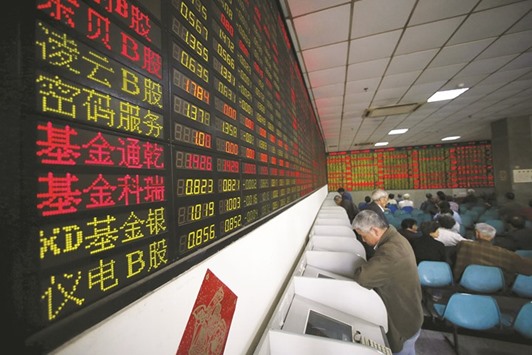Fund managers who have watched Asia’s junk bond market more than quadruple in size the past decade are warning there’s plenty to lose and little to gain from buying into a record rally.
The notes of caution add to a growing chorus of global investors who say unprecedented easing by central banks is prompting creditors to jump blindly into investments that have a high risk of default. Veterans at Schroder Investment Management, Nikko Asset Management Asia and NN Investment Partners say ignoring leverage that has shot up to a decade high at Asian borrowers is a recipe for pain.
Asian companies that binged on debt to fuel growth after the global financial crisis are flashing warning signs more troubling than those elsewhere in the world, as mountains of bad lending in China and India add to woes. The region’s non- financial firms on average have total debt that is 103% of their equity, the highest in data going back to 2006, compared with 83% in the US
“I feel investors aren’t being compensated for riding all the way down the credit curves,” said Leong Wai Hoong, a senior money manager in Singapore at Nikko Asset who has been following Asia’s bond market since 1999. “The current tight valuation doesn’t offer enough buffer for any bad news.”
The rally in Asian non-investment grade bonds has been driven in part by shrinking supply of such securities this year, as Chinese borrowers increasingly turn to their local market where central bank easing has reduced financing costs.
The average yield on junk debentures from the region in dollars has dropped 275 basis points this year to a record low 6.47%, according to Bank of America Merrill Lynch indexes.
Issuance of the securities from Asian companies outside Japan in dollars, euros and yen has fallen 23% in 2016 to a four-year low of $7.5bn.
“The uptick in bond performance reflects the lack of high- yield supply rather than any bullish view of fundamentals,” said Raymond Chia, who runs the Asian credit research team for Schroder and has 11 years of experience with Asian junk bonds. “You may not always catch a profit from the start, but you can protect against a lot of downside if you go back to the basics of assessing companies’ fundamentals.”
Such scrutiny is becoming more important as creditworthiness deteriorates. For every upgrade of Asian companies excluding Japan this year, there were 12 downgrades by Moody’s Investors Service, the highest ratio in at least 17 years, Bloomberg data show.
“We have seen significant capital appreciation year-to-date,” said Luke Spajic, Singapore-based head of portfolio management for emerging Asia at Pacific Investment Management Co. “Going forward, we would trim some exposure to selected Asian high-yield bonds.”
To be sure, junk bond markets elsewhere have also faced warnings as yield-hungry investors pile into riskier assets. UBS Group has said recession risks threaten more defaults in the US. European money managers ranked “bubbles in credit” as their top concern in a Bank of America survey. Global defaults have reached 117 this year, 60% higher than the tally at this time in 2015, according to an August 25 report by S&P Global Ratings.
In Asia, concerns are mounting that investors starving for higher-yielding products may repeat mistakes made in the past. The last time the market was this dry in 2012, a number of issuers that raised money went on to founder.
Indonesian’s PT MNC Investama Tbk sold $365mn bonds in early 2013. Since then, the notes have been downgraded three levels to B- by S&P and last traded at about 70 cents on the dollar. China’s Anton Oilfield Services Group also sold securities that year. Fitch Ratings subsequently cut the rating on the notes, which last traded at about 67 cents, seven notches to CCC-.
Anton Oilfield’s external public relations firm said it declined to comment. MNC Investama’s investor relations officials didn’t respond to e-mails.
Some investors take the low issuance as a positive sign.
“While supply has remained relatively stable, demand has been strong recently,” said Amanda Stitt, London-based investment director at Legg Mason Global Asset Management. “So it’s a bullish case.”
But the weak supply may not last, according to Clement Chong, senior credit analyst in Singapore at NN Investment Partners who has been covering the market for 15 years. Asian junk dollar bond sales more than doubled to $2.7bn this quarter from a year earlier.
“At the moment, it’s a sellers market,” Chong said. “But I’m not sure how sustainable this situation will be.”

Investors look at computer screens showing stock information at a brokerage house in Shanghai. Fund managers who have watched Asia’s junk bond market more than quadruple in size the past decade are warning there’s plenty to lose and little to gain from buying into a record rally.
